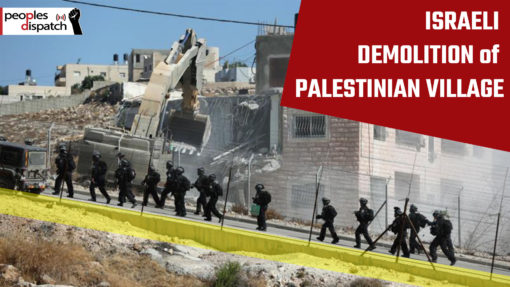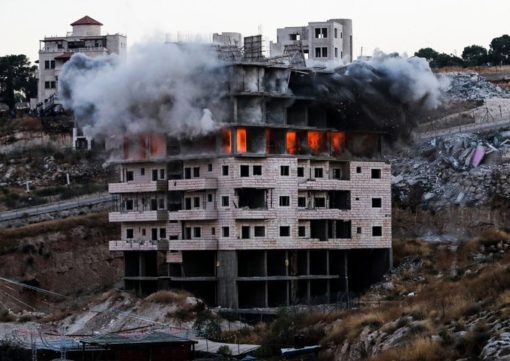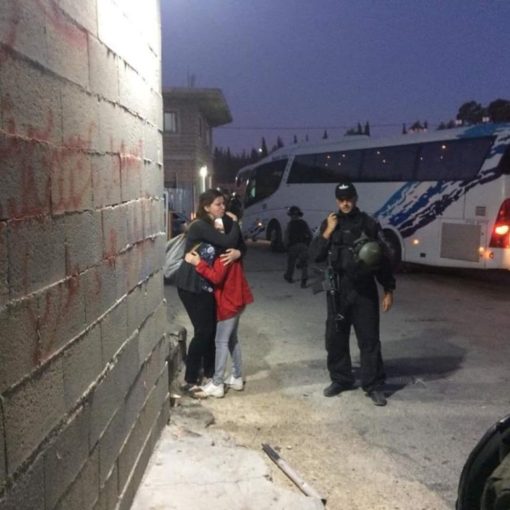
On Monday morning, Israel started demolition of Palestinian residential buildings in the Sur Baher village in the occupied East Jerusalem. According to Palestinians residing in the Wadi al-Hummus neighborhood of the village, hundreds of Israeli soldiers accompanied with bulldozers arrived in the village at dawn.
The residents also said that Israel was targeting 16 residential buildings, comprising of approximately 100 apartments, for demolition. According United Nations, the demolitions would see 17 people displaced and another 350 affected. The state of Israel considers these Palestinian homes as a ‘security risk’ due to their close proximity to the illegal apartheid wall, referred to by Israel as the ‘separation barrier’.
Diana Buttu, Palestinian lawyer-activist and former Palestine Liberation Organization legal adviser, speaking toPeoples Dispatch said, “It is extremely alarming that these demolitions are being carried out with complete impunity, and that the United States government has given Israel a complete green light to carry out these demolitions.”
The Palestine People’s Party (PPP) condemned the demolition in a statement, terming it as crimes against humanity and part of the policy of ethnic cleansing of Palestinains by Israel.
Palestinian, Israeli as well as international activists who were present at the scene reported that the soldiers forcibly evacuated a family from one of the buildings, along with some of the activists who were protesting the evacuation. Israeli soldiers also used explosives to demolish one of the buildings.
 Israeli soldiers also used explosives to demolish one of the buildings
Israeli soldiers also used explosives to demolish one of the buildings
According to Diana Buttu, more than 24,000 Palestinians live in this area of occupied East Jerusalem. The construction of the apartheid wall by Israel after 2003 resulted in the separation of Palestinian families from one another.
Israel now claims that it needs a buffer zone in order to protect the wall, which effectively means that it intends to demolish any houses that are in close proximity to the wall. Most of these houses are in the Palestinian authority (PA)-controlled areas- which issues the building permits.
A move to annex Jerusalem by Israel
Buttu said that these demolitions will set a precedent that would allow Israel to proceed with future demolitions with impunity, as well as to unilaterally continue to limitlessly expand the buffer zone area close to the wall. This would result in more Palestinian homes being made part of the buffer zone, enabling more Palestinian home demolitions in the occupied East Jerusalem and the occupied West Bank.
Last month, the Israeli Supreme Court ruled in favor of the military, following a seven-year-long legal battle that was waged against an order issued by the Israeli defence ministry to evacuate apartments deemed close to the apartheid wall in the occupied West Bank. The court’s ruling also set a deadline for the demolition of these homes to Monday, July 22.
 Palestinian mother hugs her daughter while being forced to leave her home by Israeli occupation forces in order to demolish it in Sur Baher neighborhood
Palestinian mother hugs her daughter while being forced to leave her home by Israeli occupation forces in order to demolish it in Sur Baher neighborhood
The defence ministry had issued an order for the demolition of about 70 apartments in 13 out of the 16 buildings.
The Israeli actions were condemned by the United Nations (UN), with the UN humanitarian coordinator, Jamie McGoldrick, and several other UN officials urging Israel last week to not go ahead with the demolition plans, stating that more than 350 Palestinians will get displaced as a result and risk “massive property loss”.
Palestinian prime minister Mohammed Shtayyeh said that the Palestinians will lodge a complaint with the International Criminal Court regarding the Sur Baher demolitions, calling it a “forced displacement of the people of Jerusalem from their homes and lands – a war crime and a crime against humanity.”
The village of Sur Baher is located between the occupied East Jerusalem and the occupied West Bank. Israel has been occupying this area since the 1967 six-day war. Under the Oslo accords of 1993, most of the Palestinian structures situated in the Wadi al-hummus neighborhood are in Area A of the occupied West Bank, and are stipulated to be under Palestinian authority and civilian control.




